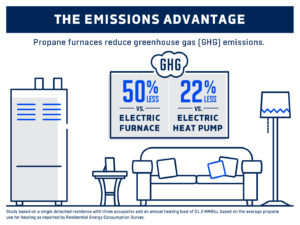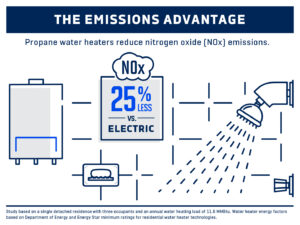When you’ve decided to make a move into a new home there are many unanswered questions to think about. Add using propane to that list, especially if you’ve never lived in a propane powered home before, and that can lead to more questions. Propane is an energy source that is embraced by nearly 50 million homeowners, according to the National Propane Gas Association. Every year, more families are discovering this clean and efficient energy source which leads to more questions about propane powered homes. Here are some common questions about propane powered homes:
1. I’ve never used propane before, what can I expect?
Some who have never used propane as an energy source before may look at it as a big question mark. Propane – sometimes known as liquefied petroleum gas or LPG – is very similar to natural gas. It is compressed and stored as a liquid, is nontoxic, colorless, and odorless. There is an odorant added as a safety precaution to detect any potential leaks. The main difference between propane and natural gas, other than the chemical make-up, is that propane is stored in a tank on your property rather than in a pipeline system.
With propane, you can expect a clean energy source that is domestically produced, readily available, and affordable. Propane can reduce emissions beyond even electricity when used for home appliances. Ninety percent of all propane used across the world is produced in North America. This allows the industry to maintain jobs here at home and offer propane at a reasonable price. When looking at the full life cycle of propane compared to any other alternative energy – yes, even electricity – it has the lowest overall total cost of ownership.
What can you expect from Delta Liquid Energy (DLE) as your trusted propane provider? We have been delivering propane since 1936. We are family owned and operated and will treat you as such. Our team of delivery specialists and service technicians are highly trained in all aspects of propane safety. They will enter your home or property with a smile and extensive propane knowledge. When speaking about DLE’s service in an emergency, Tehachapi customer Lisa Skura said, “You (DLE) came out immediately, I was very happy with the service. I said it was an emergency and you were right here. That’s what you need, you need someone who is listening and will come right away.”
2. Is this propane tank safe?
In one word, YES! Propane tanks are built with reinforced steel and have safety features built in. The service valve, regulator, and safety relieve valve all work to protect your tank and your property. Our blog post, Safety Features of Your Propane Tank describe these in detail. As an additional layer of precaution, propane has an additive that smells similar to a skunk’s spray to help users identify potential leaks. There are other home troubleshooting measures you can take to detect a leak. Your best bet, however, is to leave that to the professionals.
A propane tank’s nameplate is another way to identify if the tank is safe for use. Each propane tank has a unique nameplate that deems is acceptable to house propane. If the nameplate ever becomes unreadable or falls off, the tank is no longer seen as a propane tank. Without a proper nameplate, it can no longer be used to store this fuel.
3. What appliances use propane?
Another question that should be addressed right off the top when purchasing a home that uses propane is: which appliances are powered by this energy source. Propane can power many home appliances from your stove to your water heater, your back up generator to your outdoor living space. Some propane powered homes will not have everything powered by the same energy source. Some appliances may be electric. In order to get the most out of your propane home, and for it to be the most cost effective for you, all your appliances should run on propane. If some do not, consider having them converted.
A helpful resource: DLE blog post, Learning About Residential Propane Appliances
4. Who owns the propane tank?
It’s important to find out who owns the propane tank on your new property. Is it you – the homeowner or renter? Or, is it the propane company servicing the tank. If you move onto a property with a DLE tank installed, you will find a DLE logo sticker right on the tank. There are many advantages to using a tank owned by your propane provider. First and foremost, the maintenance and liability are not your responsibility. Delta Liquid Energy makes the process of using a company owned tank seamless. We will take care of all DLE owned propane equipment so you don’t have to think twice. If you do choose to own your propane tank, or purchase it along with your property, your purchase costs are upfront rather than a monthly maintenance fee. You also will have the option of choosing a propane supplier. Weighing your priorities in tank ownership is an important part of purchasing a propane powered home.
5. What size is the propane tank OR what size propane tank is appropriate for my home?
Knowing the gallon capacity of your propane tank will help you gauge your annual propane use. Properly outfitting your property with the right size tank will ensure you receive the right amount of deliveries per year as well. If your tank is too small, you will end up seeing your delivery specialist more often than you see your dentist. Install a tank too large for your annual use and it’s possible to lose track of how much fuel you have left. Fortunately, propane does not degrade over time. Therefore, it is perfectly safe to have propane sit in your tank unused for any length of time. It’s optimal though, to have about two to three deliveries per year. The easiest way to find out the size of the tank already installed on your property is to read the nameplate welded to the tank.
If you do not already have a tank on your newly purchased property and are unsure about how much fuel you will use in a year, we can help estimate based on:
- The appliances you are powering with propane
- The size or square footage of your home
- Where your home is located
- How many people live in your home and what their energy consumption looks like
If you are using a Delta Liquid Energy owned tank, service agreement fees will vary depending on the size of your tank. Another reason it is important to have the right tank size for your use.
These are just a few questions that may come to mind when purchasing a home or property powered by propane. Delta Liquid Energy sales managers and customer service representatives are available to answer any others you may have. Contact us to learn more about powering your home with propane.
Additional Sources:









